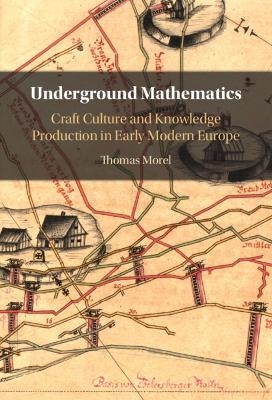
Underground Mathematics
Craft Culture and Knowledge Production in Early Modern Europe
Seiten
2022
Cambridge University Press (Verlag)
978-1-009-26730-4 (ISBN)
Cambridge University Press (Verlag)
978-1-009-26730-4 (ISBN)
Morel tells the story of subterranean geometry, a forgotten discipline that developed in the silver mines of early modern Europe where mining and metallurgy were of great significance. Through vivid case studies, he illustrates how geometry was used in metallic mines, from surveying to map-making, by practitioners using esoteric manuscripts.
Thomas Morel tells the story of subterranean geometry, a forgotten discipline that developed in the silver mines of early modern Europe. Mining and metallurgy were of great significance to the rulers of early modern Europe, required for the silver bullion that fuelled warfare and numerous other uses. Through seven lively case studies, he illustrates how geometry was used in metallic mines by practitioners using esoteric manuscripts. He describes how an original culture of accuracy and measurement paved the way for technical and scientific innovations, and fruitfully brought together the world of artisans, scholars and courts. Based on a variety of original manuscripts, maps and archive material, Morel recounts how knowledge was crafted and circulated among practitioners in the Holy Roman Empire and beyond. Specific chapters deal with the material culture of surveying, map-making, expertise and the political uses of quantification. By carefully reconstructing the religious, economic and cultural context of mining cities, Underground Mathematics contextualizes the rise of numbered information, practical mathematics and quantification in the early modern period.
Thomas Morel tells the story of subterranean geometry, a forgotten discipline that developed in the silver mines of early modern Europe. Mining and metallurgy were of great significance to the rulers of early modern Europe, required for the silver bullion that fuelled warfare and numerous other uses. Through seven lively case studies, he illustrates how geometry was used in metallic mines by practitioners using esoteric manuscripts. He describes how an original culture of accuracy and measurement paved the way for technical and scientific innovations, and fruitfully brought together the world of artisans, scholars and courts. Based on a variety of original manuscripts, maps and archive material, Morel recounts how knowledge was crafted and circulated among practitioners in the Holy Roman Empire and beyond. Specific chapters deal with the material culture of surveying, map-making, expertise and the political uses of quantification. By carefully reconstructing the religious, economic and cultural context of mining cities, Underground Mathematics contextualizes the rise of numbered information, practical mathematics and quantification in the early modern period.
Thomas Morel is Professor of the History of Mathematics at the University of Wuppertal, Germany.
Introduction; 1. Of scholars and miners; 2. A mathematical culture: the art of setting limits; 3. The mines and the court; 4. Writing it down: innovation, secrecy, and print; 5. 'So fair a subterraneous city': mapping the underground; 6. How to teach it?: finding the right direction; 7. 'One of geometry's nicest applications': crafting the Deep-George tunnel (1771–1799); Conclusion.
| Erscheinungsdatum | 12.12.2022 |
|---|---|
| Zusatzinfo | Worked examples or Exercises |
| Verlagsort | Cambridge |
| Sprache | englisch |
| Maße | 158 x 235 mm |
| Gewicht | 590 g |
| Themenwelt | Geisteswissenschaften ► Geschichte ► Regional- / Ländergeschichte |
| Mathematik / Informatik ► Mathematik ► Geschichte der Mathematik | |
| Naturwissenschaften | |
| ISBN-10 | 1-009-26730-2 / 1009267302 |
| ISBN-13 | 978-1-009-26730-4 / 9781009267304 |
| Zustand | Neuware |
| Haben Sie eine Frage zum Produkt? |
Mehr entdecken
aus dem Bereich
aus dem Bereich
Erinnerungen
Buch | Softcover (2024)
Pantheon (Verlag)
CHF 22,40


